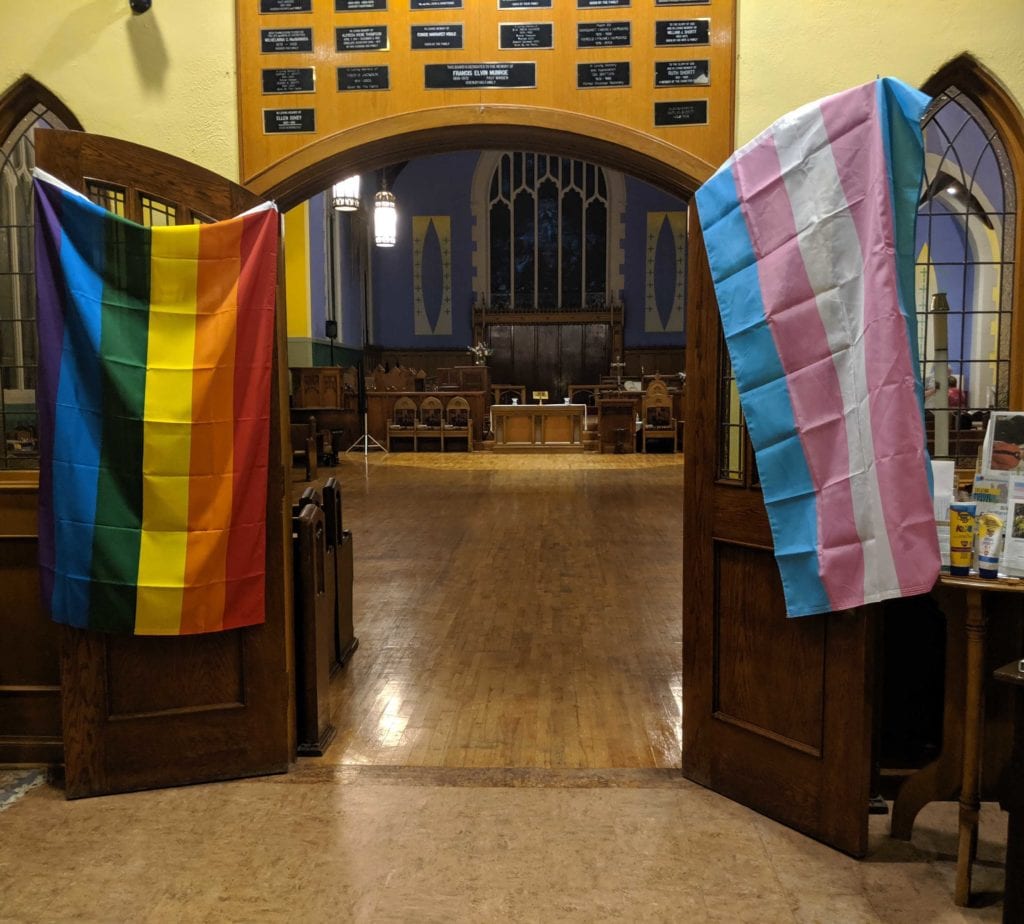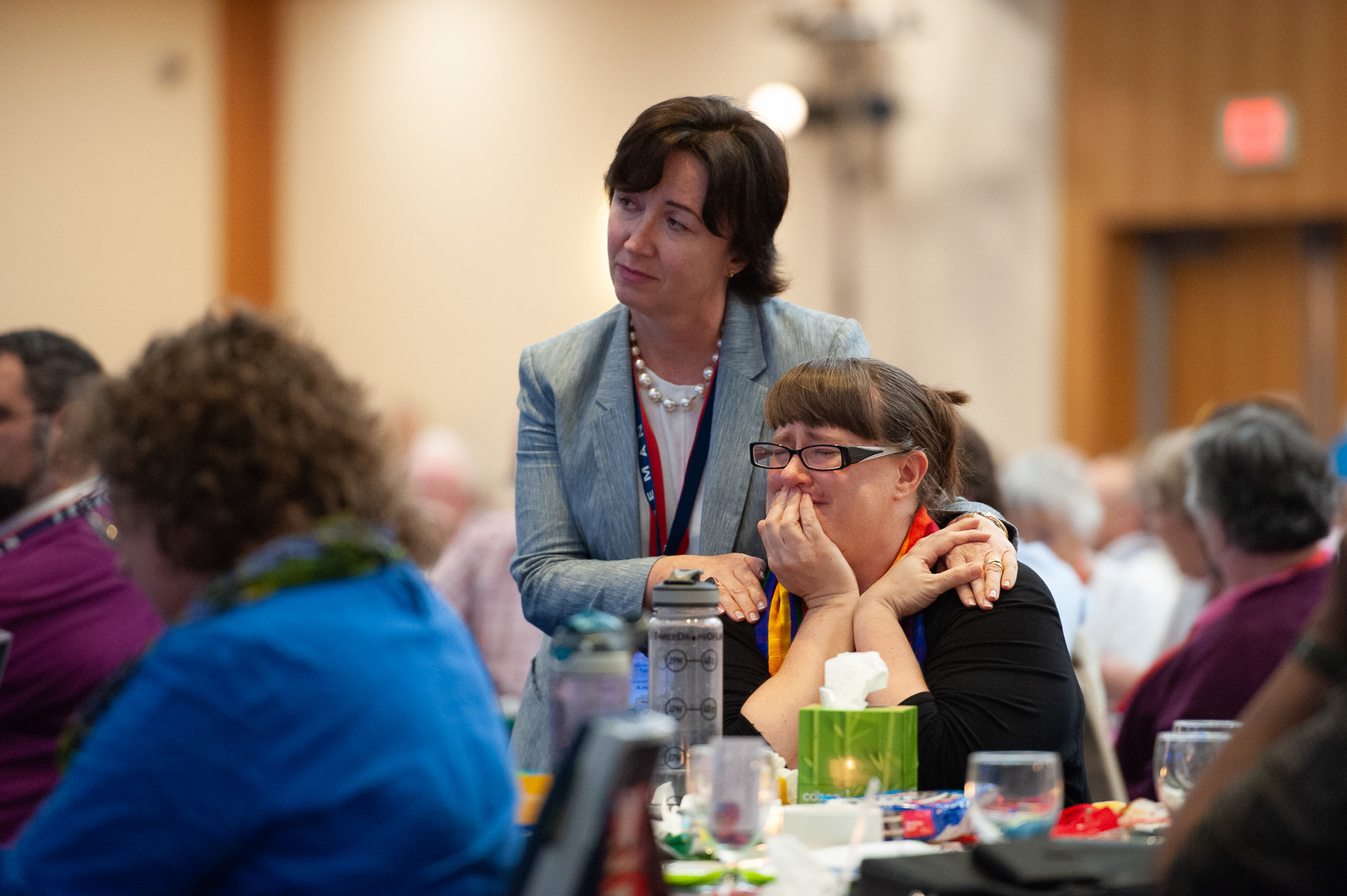Some Canadian Anglicans are trying to be positive after their church failed to pass a motion that would have formally acknowledged same-sex marriage in the denomination, but Eliot Waddingham is frustrated.
The 27-year-old, who works as an LGBTQ2 educator, left their Ottawa church a few years ago, but like a number of LGBTQ2 Christians, was very invested in the events at the national Anglican meeting earlier this month. They think that the vote’s failure was a blow for visibility.
You may unsubscribe from any of our newsletters at any time.
“I know there’s been a really concentrated effort by Anglicans to contact the media who have been been covering this to make sure they understand that the vast majority of people voted for same-sex marriage, and it’s really just a function of the way our system is set up that we weren’t able to pass it,” Waddingham says.
“But I think it’s really important that we acknowledge that it failed.”
At the Anglican Church of Canada’s General Synod in mid-July, a vote to amend the denomination’s marriage canon to remove references to gender failed by just two votes in the church’s House of Bishops, although it passed in the houses of laity and clergy. This was the second reading of the motion — it narrowly passed first reading at the last General Synod in 2016.
While a motion to allow dioceses (church districts) to decide for themselves did pass, and many churches already marry same-sex couples, queer Anglicans are still divided about what the results of the vote mean for their church.

St. John’s Anglican Church in Toronto’s west end welcomed all to its Queer Eucharist last Wednesday — LGBTQ2 and transgender pride flags greeted people at the front entrance, and the walls of the sanctuary popped periwinkle blue, yellow and green.
At the service, General Synod delegate and longtime LGBTQ2 advocate Chris Ambidge spoke about the vote, acknowledging that while increased support for same-sex marriage in the church is promising, the results of the vote have sparked considerable pain.
The day after the vote, delegates received texts and emails from friends and family stating they were “done” with the church, he said. A couple who had planned to marry at one bishop’s church next month emailed the bishop to say they would go to another church instead.
“I know that it caused significant hurt in my parish, and undoubtedly yours too, with people wondering if they should stay or go: those people may even have left already,” said Ambidge, who is involved with Proud Anglicans, a resource for those looking for gay-friendly parishes. “And for all of that hurt, I am profoundly sorry. That damage will not be undone soon.”
But he is also hopeful. Many dioceses that weren’t previously open about their willingness to perform same-sex marriages have publicly stated after the July 12 vote they would now perform them going forward. Ambidge said he estimates that three-quarters of Anglicans in Canada now live in dioceses that offer same-sex marriages, based on the number of urban dioceses that are now affirming. He also pointed out that the proposed amendments would have allowed bishops in dioceses to control whether or not a same-sex marriage went ahead.
“Many of the young people, in my perception, are more badly hurt than I am, but I have been doing this a long time,” he says in an interview.
“I’m not going to throw the baby out with the bathwater. We will survive.”
More on Broadview: As a gay Presbyterian, we shouldn’t pat ourselves on the back just yet
The church did pass a series of motions to add wording to the preface of the marriage canon. One statement affirmed that there are varying understandings in the church about marriage, and another stated that communities already authorizing same-sex unions should know that the existing canon doesn’t ban them from doing so.
Reginald Crenshaw is a longtime member of an Anglican holy order and a gay man. He says he is cautiously optimistic that the “local option,” as many Anglicans have dubbed the above change, could be a path towards ditching the current marriage canon completely.
Crenshaw says he thinks that dioceses that don’t already practice same-sex marriage will face pressure to do so, and that, slowly but surely, the existing canon, which still states that “the Church affirms in like manner the goodness of the union of man and woman in marriage,” will become irrelevant and, one day, removed.
“Eventually we have to do what we’ve done in the secular world,” he says.
Other wording that the General Synod approved affirmed that Indigenous Anglicans — who sometimes have different understandings of marriage than non-Indigenous Christians — should be allowed to make their own decisions about whether to bless same-sex unions. Mark MacDonald, the church’s national Indigenous archbishop, says that many Indigenous communities have historically affirmed a variety of sexual expressions, but do not see same-sex relationships or activity as parallel to heterosexual marriage.

MacDonald was happy that Indigenous Anglicans were granted autonomy to decide the question for themselves, but he says Indigenous people were unfairly targeted after the marriage canon vote.
“There is quite a bit of very focused criticism on Indigenous people for the loss in the House of Bishops,” he says.
MacDonald, who is a member of the House of Bishops, abstained from voting on the marriage canon change, though he says he wanted it to pass, so long as an exception was maintained for Indigenous autonomy. He points out that more non-Indigenous bishops voted against the amendment than did Indigenous ones.
Fuelled in part by concerns that the vote failed because of “no” votes, the General Synod also passed a motion to ask the Synod’s Council to review the makeup of its membership, as well as the rules of order and procedure, and bring any recommended changes to the next conference in 2022.
Waddingham sees that as a promising next step, but still thinks the symbolism of the vote matters.
“I think we should have made a different choice,” they say. “We had an opportunity to tell the world that God’s love is unconditional, and we failed in that regard.”
For more of Broadview’s award-winning content, subscribe to the magazine today.














In the article, it would have been good to include the House of Bishop’s reasoning for not amending the marriage canon, rather than show emotional pictures and have a person who has left the Anglican Church state their opinion on the matter. (I think they call it “both sides of the story”)
Either way in the decision, people will leave the denomination, just as they did with the United Church of Canada.
The House of Bishops did not act as a single body. Each bishop had a vote, and each bishop would have their own reason for how they cast their vote.
Therefore the House of Bishops could not release a statement stating why they only achieved 62%, instead of the 66.67% required.
In the other houses (clergy and laity) the vote exceeded the required 2/3 majority very comfortably, and over 80% affirmed the statement approving the local option.
Perhaps this is a good time to remind the progressives in the UCC that the marriage policy in their denomination is also left to the congregation to decide based on its best understanding of what is marriage. Many don’t like that. The ideology of gender politics in the church is working hard to isolate congregations that don’t share their view on marriage. Surely they don’t represent the “Broadview,” do they?
As a parting gift to the last church in which I ministered I worked to make our marriage liturgy gender neutral and to provide for the inclusion of gay couples being joined in marriage. My humble opinion is simply that as a consenting adult, we should be allowed to marry whomever we choose and since the Christian Church professes to be loving, caring, forgiving, nurturing, accepting and all that good stuff, it should be accepting of a loving couple wanting to share their lives together. Let’s not forget, those writers who composed what has been accepted as Christian scripture had their own biases and ways of looking at things. As well, there was no science in their day and people had a rather narrow view of life. Isn’t it time that the Christian church realized that there are situations and matters that none of the scripture writers ever thought of? People run away from the church mainly because they find that the teaching no longer goes with their own opinion of what their church should be. Many church leaders give in to their threats to leave out of fear and, I know many won’t agree but Ill say it anyway, the fear involves losing the congregants offering envelope each week. Church should be for spiritual uplifting, teaching and reflection on the words of Jesus, not for the extension of any person’s personal opinion and certainly not for people to cherry pick the archaic passages that bolster their opinion.
“…since the Christian Church professes to be loving, caring, forgiving, nurturing, accepting and all that good stuff, it should be…” Where did you get the idea that this should be the nature of the church? Is it not from (your words) “the extension of any person’s personal opinion and certainly not for people to cherry pick the archaic passages that bolster their opinion”. Christ lived by those archaic passages, and often quoted them. Certainly He didn’t “cherry pick”
Respectfully….the things we profess to “know” about Jesus have been told orally long before they were written and the people who told the stories had an agenda. As well, we all know how stories become grossly misshapen as they are told and retold. We know almost nothing of the historical Jesus. Much of the nobler things he taught had been taught by philosophers before and after his time. We no longer stone our sons for disobeying us and we don’t sell our daughters into slavery. We don’t adhere to the 613 commandments of the Jews and we do eat pork and shellfish. Jesus probably did “cherry pick.” We don’t know. So, what is the nature of the Apostle Paul’s Christian church if not to be caring, loving, forgiving, and developing one’s personal relationship with God? I prefer a church that deals with reason rather than belief. Belief in fables and fairytales do nothing to enhance one’s spirituality. God is real. I know. But many people have been led down the path of ignorance through inept dogma and ritual.
In your rebuttal, you tend to mix up your points. First, we have non “religious” leaders who state that there was a Jesus who started a “sect” called “Christian”, which they themselves hated. (Pliny and Tacitus). Remember the Romans hated the Jews, so why would a group start a religious sect from the Jewish faith? Christ as a human being was never questioned until recently. (Whether His claims to be God or not, is a different story). What He taught (assuming he existed) was more than philosophy, it was His claim of being Divine: that changed lives, changed moral teaching, and got Him executed. Please read the gospels and note how many times Jesus quoted scripture (Old Testament), He rebutted “cherry picked Scriptures” with Scripture. (Satan’s temptation of Jesus in the desert).
Finally you have become a follower of Paul, not of Christ, whom Paul himself said not to do. (1 Corinthians 3:4-11). The Pharisees also wanted to deal with reason rather than belief (Matthew 16:1-4) They witnessed all those miracles yet they still wanted a sign. They had the all the signs they needed, but they didn’t want to believe His claims of being God. This claim doesn’t need dogma or ritual – it requires faith.
Though I applaud your apologetics I cannot agree but neither can I take the space to argue here. I must agree to the fact that we come from different viewpoints and, as I have found, arguing reason against faith is futile. My walk with God is unique to me as yours is to you. What some call scripture, to me is simply the writer’s opinion. Spiritual growth has enabled me to lay down my religious crutches and walk on my own.
Scripture… A writer’s opinion as you say….
Yet you also say: Church should be for spiritual uplifting, teaching and reflection on the words of Jesus.
Where do you get the teaching and reflection? Just from someone’s opinion? Why bother? Make you own teachings and reflections, at least you can live with them in total agreement.
Having been raised in a Christian society and having attended Christian schools and having been a pastor for fourteen years as well as having seven years university, most of my ethical teachings have come from this background. However, I have taken what I feel are the more reasonable and useful teachings of scripture and added my own reflection to come up with that which works for me. It may not work for everyone but it works very well for me and I experience God working in my life daily. We must realize that each of us has our own unique relationship with Spirit, God, Allah, the Creator, or whatever we choose to call it. I choose not to be bound by a particular writer’s opinion or the arbitrary decision by a person or body many years ago who for whatever reason determined that some writings are “inspired by God” and others are not.
You verified my last comment above.